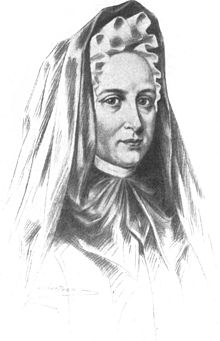Jeanne Marie Bouvier de la Motte Guyon
French Roman Catholic mystic
(Redirected fromMadame Guyon)
Jeanne-Marie Bouvier de la Motte-Guyon(13 April1648–9 June1717), commonly known asMadame Guyon,was a French mystic and one of the key advocates ofQuietism.Quietism was considered heretical by the Roman Catholic Church, and she was imprisoned from 1695 to 1703 after publishing a book on the topic,A Short and Easy Method of Prayer.

Quotes
editDictionary of Burning Words of Brilliant Writers(1895)
edit- Quotes reported in Josiah Hotchkiss Gilbert,Dictionary of Burning Words of Brilliant Writers(1895).
- Our activity should consist in placing ourselves in a state of susceptibility to Divine impressions, and pliability to all the operations of the Eternal Word.
- P. 193.
- We must forget ourselves and all self-interest, and listen, and be attentive to God.
- P. 194.
- The soul seeks God by faith, not by the reasonings of the mind and labored efforts, but by the drawings of love; to which inclinations God responds, and instructs the soul, which co-operates actively. God then puts the soul in a passive state where He accomplishes all, causing great progress, first by way of enjoyment, then by privation, and finally by pure love.
- P. 240.
- It is a great truth, wonderful as it is undeniable, that all our happiness—temporal, spiritual, and eternal — consists in one thing; namely, in resigning ourselves to God, and in leaving ourselves with Him, to do with us and in us just as He pleases.
- P. 297.
- Surrender yourselves then to be led and disposed of just as God pleases, with respect both to your outward and inward state.
- P. 542.
- We must surrender our whole being to Christ Jesus, and cease to live any longer in ourselves, that He may become our life; that being dead, "our life may be hid with Christ in God."
- P. 543.
- True simplicity regards God alone; it has its eye fixed upon Him, and is not drawn toward self; and it is as pleased to say humble as great things. All our uneasy feelings and reflections arise from self-love, whatever appearance of piety they may assume. The lack of simplicity inflicts many wounds. Go where we will, if we remain in ourselves, we shall carry everywhere our sins and our distresses. If we would live in peace, we must lose sight of self, and rest in the infinite and unchangeable God.
- P. 544.